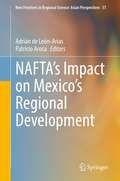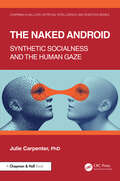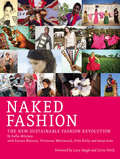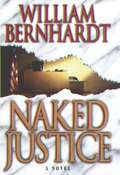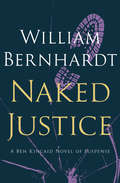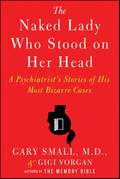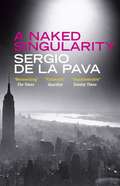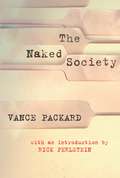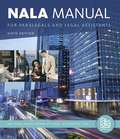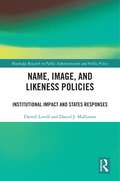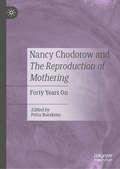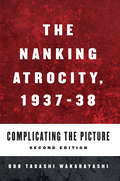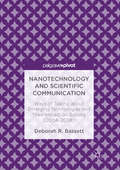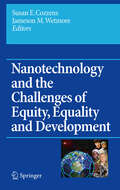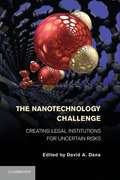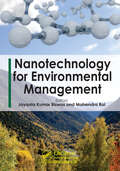- Table View
- List View
Nachhaltigkeitsberichterstattung großer Unternehmen: Eine Analyse unter besonderer Berücksichtigung des Konzepts der New Corporate Governance (BestMasters)
by Julia ReimerDie ökologische und soziale Verantwortung von Unternehmen ist schon seit Jahrzehnten Thema der Weltpolitik. Die EU stärkte 2023 mit dem Inkrafttreten der Corporate Social Reporting Directive die Bedeutung der nicht-finanziellen Berichterstattung. Auch am Kapitalmarkt steigt das Interesse an nachhaltigen Unternehmen. Die ökonomische, ökologische und die soziale Dimension der unternehmerischen Nachhaltigkeit können jedoch nicht immer in Einklang gebracht werden. Die unternehmerische Realität ist durch Zielkonflikte zwischen den drei Dimensionen geprägt. Die Forschung konnte bisher kaum praktikable Lösungsansätze zum Umgang mit Zielkonflikten in der Praxis entwickeln. Das Konzept der New Corporate Governance könnte eine neue Perspektive bieten. Indem die Zielfunktion der Unternehmen um die sozialen Präferenzen der Shareholder und die externen Auswirkungen der Geschäftstätigkeit erweitert wird, entsteht ein neues Optimierungskalkül für Unternehmensleitung und Aktionäre. Um dabei fundierte Entscheidungen treffen zu können, müssen jedoch Informationen publiziert werden. Die Untersuchung ergründet, inwieweit die aktuelle Nachhaltigkeitsberichterstattungspraxis in Deutschland kompatibel mit den Informationsanforderungen ist, die im Rahmen der New Corporate Governance entstehen.
Nachhaltigkeitsmanagement für Führungskräfte (essentials)
by Roland Pfennig Erik Müller-SchoppenDie Autoren dieses essential zeigen pointiert Grundlagen des Nachhaltigkeitsmanagements und der Individualpsychologie auf und schaffen damit Verständnis für wichtige, ein Nachhaltigkeitsmanagement fördernde Skills für Führungskräfte. Menschenkenntnis kann der Schlüssel sein für ein Sustainable Leadership Management. Bisher machen nur wenige Unternehmen ein ideologiefreies, echtes Nachhaltigkeitsmanagement vor – einige folgen, viele zeigen bislang noch keine Aktivitäten. Längst schon gibt es aber schlüssige wirtschaftliche und wissenschaftliche Ansätze, sich mit dem Thema auseinanderzusetzen – und es gibt gute Gründe dafür. Warum sind dennoch viele Unternehmen noch immer so reserviert? Die tieferen Gründe sind häufig nicht logisch, sondern „psycho-logisch“.
Nachhaltigkeitsreporting für Finanzdienstleister
by Meike Frese Bernhard ColsmanDieser Band der "Edition Bankmagazin" ist ein praxisorientierter Leitfaden zum Nachhaltigkeitsreporting in Finanzdienstleistungsunternehmen. Schwerpunkte des Werks sind die Bedeutung eines unternehmerischen Nachhaltigkeitsmanagements als Grundlage belastbarer Kommunikation, die Besonderheiten von Reporting in Banken und Versicherungsunternehmen, ein Überblick über relevante Frameworks für die Berichterstattung sowie ein ausführlicher Blick auf die Zukunftstrends von Berichterstattung zu nicht-finanziellen Aspekten der Geschäftstätigkeit.Berichterstatter finden hier die nötigen Fakten und Entscheidungskriterien, um ein effektives Reporting auf- oder auszubauen, das individuell auf ihr Unternehmen zugeschnitten ist. Schritt für Schritt wird erläutert, worauf es bei der Erstellung eines Berichts ankommt und was die Stellschrauben für Effizienz und Wirksamkeit sind. Zahlreiche Praxistipps und Fallbeispiele von Banken und Versicherern erleichtern dabei die Umsetzung und bieten Denkanstöße für die individuelle Skalierung und Ausrichtung von Berichterstattung und Kommunikation.
Nachhaltigkeitstransformationen erfolgreich initiieren und gestalten: Psychologische Perspektiven und Handlungsempfehlungen für Manager:innen (essentials)
by Paula Maria BögelDie aktuellen Geschehnisse zeigen, dass eine rasche und entschiedene Wende hin zu einer nachhaltigen Entwicklung unumgänglich ist, wenn wir uns und unseren Planeten retten wollen. Gerade Unternehmen können hier einen großen Beitrag leisten. Trotzdem kommen wir oft nicht ins Handeln oder es fehlen die Mitstreiter:innen im Unternehmen. Das essential stellt die wichtigsten Strategien für eine erfolgreiche Veränderung hin zu mehr Nachhaltigkeit vor und zeigt, wie Mitstreiter:innen für diese Transformation gewonnen werden. Es geht konkret der Frage nach, was wir aus der Psychologie für die Nachhaltigkeitstransformation lernen können. So werden psychologische Theorien verständlich vorgestellt, inspirierende Fallbeispiele gezeigt und konkrete Impulse für die Umsetzung im eigenen Unternehmen (und privatem Umfeld) gegeben.
Nachtragsmanagement bei gestörten Bauabläufen: Mehrkosten sicher ermitteln
by Steffen AhtingGestörte Bauabläufe sind bei der Durchführung von Bauabläufen längst kein Einzelfall mehr. Um den wirtschaftlichen Erfolg einer Maßnahme dennoch zu sichern und eine verantwortungsgerechte Kostenallokation herzustellen, kann die Seite, welche die Störung nicht zu verantworten hat, berechtigte Mehrkosten zurückfordern oder die Erstattung des entstandenen Schadens von der anderen Partei verlangen. Dieser Leitfaden gibt den am Bau Beteiligten ein entsprechendes Tool an die Hand, die durch Bauablaufstörungen entstehenden Mehrkosten nachvollziehbar und transparent zu berechnen und bietet eine gute Orientierung bei der gesamten Abwicklung von Bauablaufstörungen.
NAFTA’s Impact on Mexico’s Regional Development (New Frontiers in Regional Science: Asian Perspectives #51)
by Adrián de León-Arias Patricio ArocaIn this book, the dynamics of continuity and change in the regional economic development of Mexico and the US border states are analyzed. These studies cover the last 25 years, after the first trade agreement, between a developed and a developing country, tooks place, and where international trade and investment have been combined with a set of relevant local factors such as regional innovation, industrialization patterns, multinational corporations’ modes of operation, public investment, and national content of exports. The book offers researchers a precise identification of stylized facts that characterize the pattern of regional development in Mexico and the US Southwest as well as state-of-the-art applications contrasting hypotheses from new economic geography, endogenous and neo-Schumpeterian economic growth models, and new international trade. To graduate and advanced undergraduate students in the fields of spatial geographic economics, this book offers an excellent source for its updated review of current topics on regional development in Mexico. To policy makers, the book helps to identify policy areas to reinforce the dynamics of regional development. Whereas other books have looked at the several impacts of NAFTA on national economies, productive sectors, and societies, this book analyzes the trade agreement’s impact with a long-term view across the diversity of developments of Mexico´s regions. As well, the analysis is carried out with the perspective of prospective reforms of a renovated trade agreement between the United States and the new Mexican federal administration . The collaborators in this book are researchers who are experts at the international and national levels in the field of regional economic development. During the last 25 years they have conducted their analyses in different regions of Mexico and the United States as university researchers, advisors to state and federal governments, and as practitioners.
The Naked Android: Synthetic Socialness and the Human Gaze (Chapman & Hall/CRC Artificial Intelligence and Robotics Series)
by Julie CarpenterThe Naked Android: Synthetic Socialness and the Human Gaze illuminates the connection between the stories people tell, their expectations of what a robot is, and how these beliefs and values manifest in how real robots are designed and used.The introduction of the “human gaze” articulates how peoples’ expectations and perceptions about robots are ultimately based on deeply personal cultural interpretations of what is artificial or human and what problems social robots should –or should not –solve. The Naked Android clarifies how human qualities like understanding and desire are designed into robots as mediums as well as projected onto them by the people who live with them.By investigating the fluidity of identities across human culture and social robotics, this book unpacks the contextual complexities of their interactions and mutual influences. Using ethnographic methods including in-depth interviews with a variety of stakeholders, each chapter explores how people are designing social robots, the experience of living with robots, and people whose jobs it is to dream about a future integrated with robots.Key Features: Introduces the concept of the “human gaze” (and the “robot gaze”) as means of understanding how people live with robots. Each chapter includes in-depth interviews with people who make, live with, or create art about robots. Using ethnographic methods, paints a vivid description of the interconnecting influences of science fiction, human imagination, and real technology.
Naked Fashion
by Safia Minney Lucy Siegle Livia FirthNaked Fashion invites you to join the movement of consumers, entrepreneurs, and creative professionals who are using their purchasing power, talents, and experience to make fashion more sustainable. Anyone with an active interest in fashion and where our clothes come from or looking for a career in fashion and the media will find inspiration and advice on how to make a difference. Designers and creatives from all over the world--including photographers, models, illustrators, actors, and journalists--talk about what they are doing differently to make fashion more sustainable: Emma Watson explains why fair trade fashion is so important to her. Summer Rayne Oakes describes how she took on the model agencies. Vivienne Westwood talks high-fashion without the high stakes for the planet. Inside you will find fair trade and environment, styling and modeling, up-cycling and "slow" fashion, how we can change the high street, an ethical brand directory, and stunning visuals throughout. Safia Minney is founder and CEO of fair trade and sustainable fashion label People Tree. She has turned a lifelong interest in environment, trade, and social justice issues into an award-winning social business. Minney is widely regarded as a leader in the fair trade movement and has been awarded Outstanding Social Entrepreneur by the World Economic Forum and an MBE for her work in fair trade and the fashion industry.
Naked Justice (Ben Kincaid Series #6)
by William BernhardtWhen Wallace Barrett is seen fleeing his house, splattered with blood, after his wife and two young daughters are gruesomely murdered, it's going to take one hell of a lawyer to get Barrett off.
Naked Justice (The Ben Kincaid Novels #6)
by William BernhardtA lawyer must defend a mayor accused of murdering his family: &“Bernhardt again proves himself master of the courtroom drama&” (Library Journal). With his winning smile, acting experience, and history as one of the best quarterbacks Oklahoma University has ever seen, Wally Barrett had no trouble becoming Tulsa&’s first black mayor. But this perfect politician has a dark side, too. One afternoon at an ice cream parlor, a dozen people watch as he nearly hits his wife during an argument about their children. That same night, a neighbor calls the police after hearing screams from inside the mayor&’s house. The patrolman discovers the first lady and her children murdered, and the mayor nowhere to be found. Barrett is captured after a high-speed chase, insensible and covered in blood. The only person willing to defend him is Ben Kincaid, a struggling defense lawyer with a history of winning impossible cases. But when the national media descends on Tulsa, Kincaid will have to do something he&’s never done before, and oversee an increasingly wild three-ring circus.
The Naked Lady Who Stood on Her Head: A Psychiatrist's Stories of His Most Bizarre Cases
by Gary Small MD Gigi Vorgan“Stories of human behavior at its most extreme….With humor, compassion, empathy, and insight, Small searches for and finds the humanity that lies hidden under even the most bizarre symptoms.”—Daniel H. Pink, author of Drive and A Whole New MindA psychiatrist’s stories of his most bizarre cases, The Naked Lady Who Stood on Her Head by Gary Small, M.D., and Gigi Vorgan—co-authors of The Memory Bible—offers a fascinating and highly entertaining look into the peculiarities of the human mind. In the vein of The Man Who Mistook His Wife for a Hat, Awakenings, and the other bestselling works of Oliver Sacks, The Naked Lady Who Stood on Her Head surprises, enthralls, and illuminates as it focuses on medical mysteries that would stump and amaze the brilliant brains on House, M.D.
A Naked Singularity
by Sergio De La PavaNOW A MAJOR FILM STARRING JOHN BOYEGA, OLIVIA COOKE AND BILL SKARSGÅRD"The Wire written by Voltaire" Sunday Times"Crime and Punishment as reimagined by the Coen Brothers" The MillionsCasi is a hotshot public defender working on the front line of America's War on Drugs. So far he's on the winning side. He's never lost a case. But nothing lasts forever, and pride like his has a long way to fall. Funny, smart and always surprising, A Naked Singularity speaks a language all of its own and reads like nothing else ever written. Casi's beautiful mind and planetary intelligence make him an inimitable and unforgettable narrator. In De La Pava's hands, the labyrinthine miseries of the New York Justice System are as layered and diabolical as Dante's nine circles of Hell. But the Devil doesn't hog the best lines. There are plenty here to go around.
A Naked Singularity: A Novel
by Sergio de la Pava“Propulsive . . . The novel’s chaotic sprawl, black humor and madcap digressions make it a thrilling rejoinder to the tidy story arcs [of] most crime fiction.” —The Wall Street JournalWinner of the PEN/Robert W. Bingham Prize for Best Debut NovelNamed a Best Book of the Year in the Wall Street Journal, Houston Chronicle, and Philadelphia City PaperA Naked Singularity tells the story of Casi, born to Colombian immigrants, who lives in Brooklyn and works in Manhattan as a public defender—one who, tellingly, has never lost a trial. Never. In the book, we watch what happens when his sense of justice and even his sense of self begin to crack—and how his world then slowly devolves. A huge, ambitious novel in the vein of DeLillo, Foster Wallace, Pynchon, and even Melville, it’s told in a distinct, frequently hilarious voice, with a striking human empathy at its center. Its panoramic reach takes readers through crime and courts, immigrant families and urban blight, media savagery and media satire, scatology and boxing, and even a breathless heist worthy of any crime novel. If Infinite Jest stuck a pin in the map of mid-90s culture and drew our trajectory from there, A Naked Singularity does the same for the feeling of surfeit, brokenness, and exhaustion that permeates our civic and cultural life today. In the opening sentence of William Gaddis’s A Frolic of His Own, a character sneers, “Justice? You get justice in the next world. In this world, you get the law.” A Naked Singularity reveals the extent of that gap, and lands firmly on the side of those who are forever getting the law.“A great American novel.” —Toronto Star
The Naked Society
by Rick Perlstein Vance PackardOriginally published in 1964, The Naked Society was the first book on the threats to privacy posed by new technologies such as modern surveillance techniques and methods for influencing human behavior. This all new edition of the book features an introduction by noted historian Rick Perlstein.
Nakli Waris: नकली वारिस
by Surender Mohan Pathak"नकली वारिस" सुरेंद्र मोहन पाठक द्वारा लिखा गया एक रोमांचक रहस्य उपन्यास है, जिसमें धोखाधड़ी, पहचान की गुत्थी और षड्यंत्र की जटिल कहानी बुनी गई है। कहानी काठमांडू के एक होटल से शुरू होती है, जहां एक अमीर उद्योगपति राजा शिवप्रताप सिंह की कथित बेटी काजल रहस्यमय परिस्थितियों में पाई जाती है। लेकिन जल्द ही, घटनाओं का ऐसा चक्र शुरू होता है, जिससे उसकी असली पहचान पर सवाल उठने लगते हैं। जब डॉक्टर सूर्यदेव थापा को इस मामले की सच्चाई का अहसास होता है, तो उसे जान से मारने की कोशिश की जाती है। पत्रकार सुनील, जो हमेशा सच्चाई की खोज में रहता है, इस गुत्थी को सुलझाने में जुट जाता है। क्या काजल वास्तव में राजा शिवप्रताप सिंह की बेटी है, या उसके नाम पर कोई और वारिस बनने की साजिश कर रहा है? यह उपन्यास पाठकों को रहस्य और सस्पेंस के जाल में बांधकर अंत तक रोमांचित रखता है।
NALA Manual For Paralegals And Legal Assistants: A General Skills And Litigation Guide For Today's Professionals
by Inc. National Association of Legal AssistantsSucceed on the job--and in your course--and prepare for the Certified Paralegal examination with the NALA Manual. More than 100 leading authorities with a wide range of experience in legal disciplines and management have contributed to this comprehensive manual since it was introduced in 1976. Covering all the skills required of paralegals today, the updated manual includes a collection of successful solutions to actual assignments accomplished by working paralegals nationwide. These proven techniques and procedures can be used as starting points from which you can make changes, adaptations, and modifications when you encounter similar situations on the job.
Name, Image, and Likeness Policies: Institutional Impact and States Responses (Routledge Research in Public Administration and Public Policy)
by Darrell Lovell Daniel MallinsonThis book examines the path that name, image, and likeness (NIL) has taken in the first years of the policy, how the expansion has led to differing approaches across state and universities, and how administrators in selected states are dealing with the rulemaking power they have. After an introduction contextualising how NIL policies have impacted the administrative approach at institutions, the remaining chapters focus on how NIL has altered the role of compliance offices and administrators tasked with monitoring academic and financial activity in athletic departments. Chapters leverage theories of policy diffusion and implementation to offer context on the topics from administrative and policy perspectives, whilst also examining how entrepreneurs are both using the policies to advance the status of the athletic arms of their institutions while dealing with these compliance struggles. The authors conclude with a discussion of an unsettled policy landscape and whether stricter guidelines are on the horizon. Name, Image, and Likeness Policies will appeal to both scholars studying sport and law, public policy, public administration, state politics, and governance, as well as readers seeking to better understand what impacts NIL is having on the college system, and students connected to major sports such as college football and basketball.
Naming Violence: A Critical Theory of Genocide, Torture, and Terrorism (New Directions in Critical Theory #52)
by Professor Mathias ThalerMuch is at stake when we choose a word for a form of violence: whether a conflict is labeled civil war or genocide, whether we refer to “enhanced interrogation techniques” or to “torture,” whether a person is called a “terrorist” or a “patriot.” Do these decisions reflect the rigorous application of commonly accepted criteria, or are they determined by power structures and partisanship? How is the language we use for violence entangled with the fight against it?In Naming Violence, Mathias Thaler articulates a novel perspective on the study of violence that demonstrates why the imagination matters for political theory. His analysis of the politics of naming charts a middle ground between moralism and realism, arguing that political theory ought to question whether our existing vocabulary enables us to properly identify, understand, and respond to violence. He explores how narrative art, thought experiments, and historical events can challenge and enlarge our existing ways of thinking about violence. Through storytelling, hypothetical situations, and genealogies, the imagination can help us see when definitions of violence need to be revisited by shedding new light on prevalent norms and uncovering the contingent history of ostensibly self-evident beliefs. Naming Violence demonstrates the importance of political theory to debates about violence across a number of different disciplines from film studies to history.
Nancy Chodorow and The Reproduction of Mothering: Forty Years On
by Petra BueskensThis book analyzes Nancy Chodorow’s canonical book The Reproduction of Mothering, bringing together an original essay from Nancy Chodorow and a host of outstanding international scholars—including Rosemary Balsam, Adrienne Harris, Elizabeth Abel, Madelon Sprengnether, Ilene Philipson, Meg Jay, Daphne de Marneffe, Alison Stone and Petra Bueskens—in a mix of memoir, festschrift, reflection, critical analysis and new directions in Chodorowian scholarship. In the 40 years since its publication, The Reproduction of Mothering has had a profound impact on scholarship across many disciplines including sociology, psychoanalysis, psychology, ethics, literary criticism and women’s and gender studies. Organized as a “reproduction of mothering scholarship”, this volume adopts a generationally differentiated structure weaving personal, political and scholarly essays. This book will be of interest to scholars across the social sciences and humanities. It will bring Nancy Chodorow and her canonical work to a new generation showcasing classic and contemporary Chodorowian scholarship.
The Nanjing Massacre and Sino-Japanese Relations: Examining the Japanese 'Illusion' School
by Zhaoqi ChengBased on extensive research on the International Military Tribunal for the Far East, this book closely examines the claims and controversy surrounding the ‘Nanjing Massacre’, a period of murder in 1937-1938 committed by Japanese troops against the residents of Nanjing (Nanking), after the capture of the then capital of the Republic of China, during the Second Sino-Japanese War. Focusing on weighing up arguments denying Nanjing Massacre, this book considers the Japanese ‘Illusion’ school of thought which contests the truth of the Nanjing Massacre claims, including the death toll and the scale of the violence. The Nanjing Massacre remains a controversial issue in Sino-Japanese relations, despite the normalization of bilateral relations, and this book goes to great lengths to examine the events through comparative narratives, investigating different perspectives and contributings to the debate from the extensive research of the Tokyo Trial Research Centre at Shanghai, as well as volumes of Chinese and Japanese historical documents.
The Nanking Atrocity, 1937-1938: Complicating the Picture
by Bob Tadashi WakabayashiFirst published in 2007, The Nanking Atrocity remains an essential resource for understanding the massacre committed by Japanese soldiers in Nanking, China during the winter of 1937-38. Through a series of deeply considered and empirically rigorous essays, it provides a far more complex and nuanced perspective than that found in works like Iris Chang's bestselling The Rape of Nanking. It systematically reveals the flaws and exaggerations in Chang's book while deflating the self-exculpatory narratives that persist in Japan even today. This second edition includes an extensive new introduction by the editor reflecting on the historiographical developments of the last decade, in advance of the 80th anniversary of the massacre.
Nanotechnology and Scientific Communication: Ways of Talking about Emerging Technologies and Their Impact on Society (2004-2008)
by Deborah R. BassettThis study examines findings from a 4-year-long ethnography of communication among a research university’s community of scientists and engineers working in nanoscience and nanotechnology. It includes analysis of 20 in-depth interviews with scientists and engineers from 18 different disciplines self-identified as working in nanoscale science and engineering. Using multiple methods of inquiry, including fieldwork, interviews, and textual analysis, elements of a shared speech code are presented, each of which indicate culturally distinctive understandings of psychology, sociology and rhetoric. In particular, the interview data addresses questions such as “What kind of person is a scientist?” “What is the role of science in society?” and “What is the role of communication in science?” This book will appeal to readers interested in science and society, scientific communication, and ethnography of communication.
Nanotechnology and the Challenges of Equity, Equality and Development
by Susan E. Cozzens Jameson WetmoreNanotechnology is enabling applications in materials, microelectronics, health, and agriculture, which are projected to create the next big shift in production, comparable to the industrial revolution. Such major shifts always co-evolve with social relationships. This book focuses on how nanotechnologies might affect equity/equality in global society. Nanotechnologies are likely to open gaps by gender, ethnicity, race, and ability status, as well as between developed and developing countries, unless steps are taken now to create a different outcome. Organizations need to change their practices, and cultural ideas must be broadened if currently disadvantaged groups are to have a more equal position in nano-society rather than a more disadvantaged one. Economic structures are likely to shift in the nano-revolution, requiring policymakers and participatory processes to invent new institutions for social welfare, better suited to the new economic order than those of the past.
The Nanotechnology Challenge: Creating Legal Institutions for Uncertain Risks
by David A. DanaNanotechnology is the wave of the future, and has already been incorporated into everything from toothpaste to socks to military equipment. The safety of nanotechnology for human health and the environment is a great unknown, however, and no legal system in the world has yet devised a way to reasonably address the uncertain risks of nanotechnology. To do so will require creating new legal institutions. This volume of essays by leading law scholars and social and physical scientists offers a range of views as to how such institutions should be formed. It is essential reading for anyone who may wonder how we can continue to innovate technologically in a way that both delivers the benefits and sustains human health and the environment.
Nanotechnology for Environmental Management
by Mahendra Rai Jayanta Kumar Biswas"Nanotechnology for Environmental Management" is your gateway to the latest advancements in environmental science and technology. Edited by leading international scientists, this book delves into the diverse approaches and applications of nanomaterials and nanotechnologies, offering insights into their potential for environmental remediation, energy management, and sustainable development. Each chapter showcases cutting-edge innovations, making this book an essential reference for students, researchers, scientists, technicians, and professionals in environmental management and regulation.Explore the promises and challenges of nanotechnology in addressing environmental issues, and gain valuable perspectives on the future of sustainable development. With its thorough examination of state-of-the-art nanotechnological solutions, "Nanotechnology for Environmental Management" is your indispensable guide to navigating the complexities of environmental science and technology.





